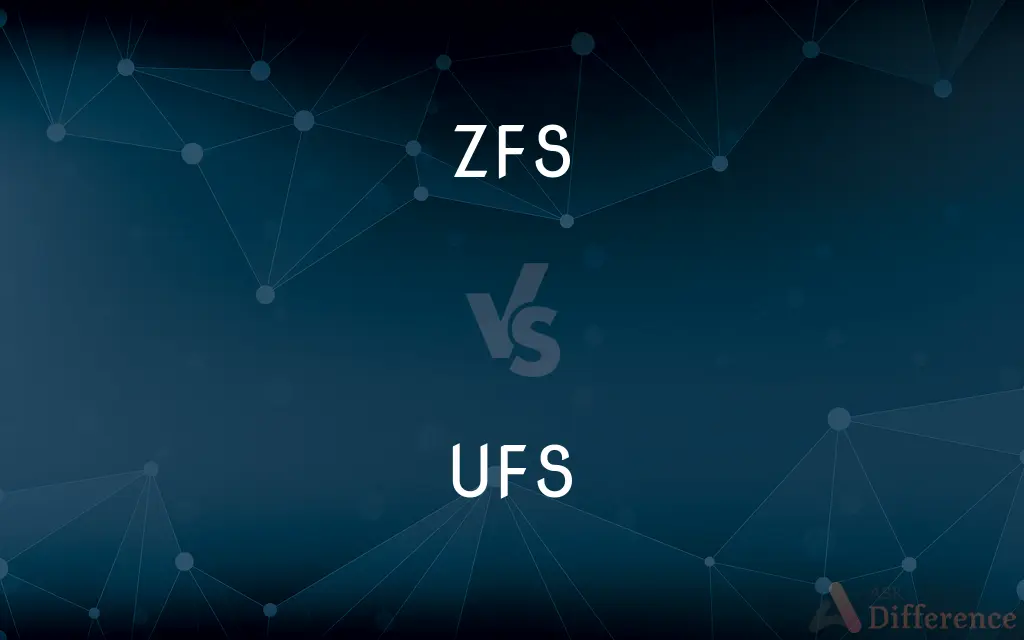ZFS vs. UFS — What's the Difference?
By Tayyaba Rehman — Published on January 25, 2024
ZFS (Zettabyte File System) is an advanced file system with features like high storage capacity and data integrity, whereas UFS (Unix File System) is an older file system with simpler architecture and lower storage capacity.

Difference Between ZFS and UFS
Table of Contents
ADVERTISEMENT
Key Differences
Architecture and Design: ZFS is a modern file system designed for high performance and data integrity, supporting high storage capacities and including features like snapshots and copy-on-write. UFS is a traditional file system with a simpler design and less emphasis on data integrity and performance.
Data Integrity and Protection: ZFS includes built-in data protection features like checksums and self-healing capabilities, providing robust protection against data corruption. UFS lacks these advanced data protection features and relies on additional tools for similar functionalities.
Storage Capacity: ZFS supports very large storage capacities, suitable for modern high-volume storage needs. UFS is designed for smaller-scale storage and may not efficiently handle very large volumes of data.
Scalability and Flexibility: ZFS offers greater scalability and flexibility, allowing for dynamic disk management and storage pooling. UFS is less flexible and scalable compared to ZFS.
Use Cases: ZFS is often used in enterprise-level storage solutions, NAS systems, and high-performance computing environments. UFS is typically used in older systems and simpler storage environments.
ADVERTISEMENT
Comparison Chart
Architecture
Advanced, with features like snapshots
Simpler, traditional file system
Data Integrity
Built-in data protection, checksums
Lacks advanced data protection
Storage Capacity
Suitable for high-volume storage
Designed for smaller-scale storage
Scalability
Highly scalable and flexible
Less flexible and scalable
Typical Use
Enterprise storage, NAS, high-performance
Older systems, simpler storage needs
Compare with Definitions
ZFS
Describes ZFS's suitability for high-performance computing.
ZFS is ideal for our high-performance computing needs.
UFS
UFS's use in older, legacy systems.
We maintain UFS for compatibility with our legacy systems.
ZFS
ZFS's ability to create data snapshots.
We regularly take ZFS snapshots for data backup.
UFS
UFS usage in Unix operating systems.
UFS is a common file system in many Unix systems.
ZFS
ZFS feature for protecting against data corruption.
ZFS ensures data integrity through its self-healing capabilities.
UFS
A traditional Unix File System.
Our older servers still run on UFS.
ZFS
ZFS's dynamic disk management system.
ZFS's storage pooling simplifies our disk management.
UFS
The process of managing files in UFS.
File management in UFS is straightforward but lacks advanced features.
ZFS
An advanced file system with high storage capacity.
We use ZFS for our enterprise storage needs.
UFS
UFS's basic file system design.
UFS's simpler architecture is suitable for our basic storage.
Common Curiosities
Can UFS handle large data volumes effectively?
UFS is less efficient with very large data volumes compared to ZFS.
What is ZFS primarily used for?
ZFS is used for high-capacity storage solutions and data integrity.
What are the main advantages of UFS?
UFS is known for its simplicity and reliability in smaller-scale storage.
Can ZFS be used in NAS systems?
Yes, ZFS is a popular choice for NAS systems due to its scalability and data integrity features.
Is ZFS suitable for enterprise storage solutions?
Yes, ZFS is often used in enterprise and high-performance environments.
Is UFS still widely used?
UFS is used in some older or legacy systems but is less common in modern environments.
What kind of data protection does ZFS offer?
ZFS offers robust data protection with features like checksums and self-healing.
Are there any scalability limitations with UFS?
UFS is not as scalable as ZFS, especially for high-volume data storage.
What type of file system is UFS?
UFS is a traditional, simpler Unix File System.
Does ZFS support snapshots?
Yes, ZFS supports snapshots for data backup and recovery.
Can ZFS handle storage pooling?
Yes, one of ZFS's strengths is its efficient storage pooling capabilities.
Is it easy to migrate from UFS to ZFS?
Migration requires planning and expertise due to the differences in file system architecture and features.
How does ZFS ensure data integrity?
Through checksums and self-healing mechanisms that protect against corruption.
Does UFS support dynamic disk management like ZFS?
No, UFS lacks the dynamic disk management capabilities of ZFS.
Is UFS a good choice for high-performance computing?
UFS is less suited for high-performance computing compared to ZFS.
Share Your Discovery

Previous Comparison
Sustainable Development vs. Green Development
Next Comparison
I3 vs. I5Author Spotlight
Written by
Tayyaba RehmanTayyaba Rehman is a distinguished writer, currently serving as a primary contributor to askdifference.com. As a researcher in semantics and etymology, Tayyaba's passion for the complexity of languages and their distinctions has found a perfect home on the platform. Tayyaba delves into the intricacies of language, distinguishing between commonly confused words and phrases, thereby providing clarity for readers worldwide.
















































